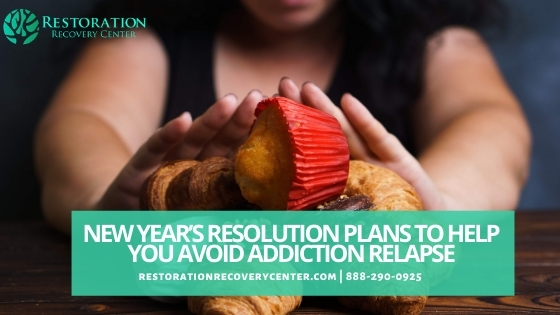New Year’s Resolution Plans to Help You Avoid Addiction Relapse
The first step to avoiding addiction relapse is to recognize that addiction to drugs or alcohol is a disease in itself. Therefore, making a decisive choice to stop using substances is not as easy as most people think especially if an addiction has already developed.
It may take a lot of time, practice and patience, not to mention self-discipline to avoid addiction relapse. Just because relapses are normal, it does not mean that someone should not make an effort to fight them.

Avoid Addiction Relapse
If avoiding relapse is among your New Year’s resolution plans, this post will help, with useful tips to avoid addiction relapse.
Engage in a long term addiction treatment to prevent relapse
Just like in any other chronic disease, treatment for addiction is not a quick fix. One time medication or a month of therapy cannot guarantee you a complete solution. For a long term addiction relapse prevention, you might want to get involved in a long term intensive treatment which should be followed by a continuous support system.
According to research, active participation in a treatment process can significantly reduce the risk of addiction relapse. Individuals who are at risk of relapsing should also get a continuous support from their counselors to prevent addiction relapse.
Identify relapse triggers and learn how to manage them
If you have a good treatment plan, you should be able to identify things that remind you of your former life in substance abuse and how you can manage the feeling of wanting to go back to that life.
Triggers may include general activities such as being around people who are still in substance abuse or certain places that remind you of the former life. These two are the most common triggers. Emotions can also trigger relapse, especially for individuals who were into substance abuse as a way to cope with stressful situations. Therapy sessions will help you identify each one of these triggers and present a doable management plan so that you can successfully avoid addiction relapse .
To avoid a possible relapse, practice honesty
Relapse and the better part of addiction require constant lying and denying that you are relapsing or already fully on addiction again.
You will find that you are always hiding the addiction substances and denying it if somebody asks you if you are still using them. This will gradually lead you to lie to yourself because the moment you find that you are not being completely honest it is a sign of emotional relapse.
There is a saying that you are as sick as the addiction secrets you keep. If you ask counsellors, one of the most challenging things in addiction therapy is how to teach the patients how to tell the truth. They are also taught the importance of admitting when they are not totally truthful and how to correct their mistakes quickly. One test to gauge your honest is if you are honest to the point that it is uncomfortable. At this point, you will be on the right track to avoiding addiction relapse.
Ask for help to avoid addiction relapse

Avoid Addiction Relapse
Most people struggling with addiction always attempt to go at it alone. They are still trying to show that they can manage their dependencies and that they are not as sick as people may think. The best solution is joining a self-help group. This will help with the long term recovery process. Some of the benefits of joining a self-help group are that the patient will never feel alone in the journey to recovery. They will always be in the company of other individuals who are also undergoing treatment, and this way, they can have the moral support they need to complete the treatment and avoid addiction relapse.






